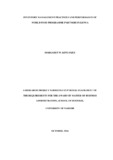| dc.description.abstract | In many firms, expenditure on inventory is a significant percentage of working capital and current assets. The main goal of inventory management is to ensure that materials are available in adequate proportions and on a timely manner. The objectives for the study included; (i) to establish the inventory management practices used by World Food Programme partners in Kenya. (ii) to establish the effect of inventory management practices on performance of World Food Programme partners in Kenya. The study used a descriptive research design. The population targeted was nineteen (19) WFP partners in Kenya. The study used a census technique. Self-administered questionnaires were used for primary data collection from the management employees of WFP partners including; warehouse manager, logistics manager and supply chain manager. It was analyzed using SPSS Version 22. Data was presented through means, standard deviations, percentages and frequencies. From the study findings, it was concluded that WFP partners used Economic Order Quantity, Just-In-Time, Vendor Managed Inventory System, ABC Analysis, Radio Frequency Identification System (RFID), Enterprise Resource Planning and Simulation in managing their stock. These organizations underscored the critical role played by inventory management practices hence they used them to enhance their performance. The various inventory management practices adopted by WFP partners significantly influenced their performance. From the multiple regression analysis, it was established that the most significant IMP in influencing performance of World Food Programme partners in Kenya is Just-In-Time followed by Economic Order Quantity, Enterprise Resource Planning, ABC analysis, Vendor Managed Inventory, Radio Frequency Identification and Simulation respectively. The study recommends that the management of WFP partners should initiate an appraisal of all the practices with a view of identifying the most important based on the line of their operations in order to ensure that they are fully implemented in order to save on costs while improving on efficiency. The IMPs should be evaluated and a bench mark for each established so that their implementation is monitored and supervised in order to yield the desired results. The WFP partners’ management should organize for seminars and workshops where managers can be trained on new insights on IMPs with a focus on creating value and dealing with internal challenges of stock control. The limitation that the study encountered was low response rate as majority of the respondents could not respond to the questionnaires in time. However, the researcher made courtesy calls to remind them to respond to the questionnaires in time. The respondents also felt that the information being sought was sensitive for disclosure which led to lack of cooperation. Similar studies have been recommended to be done on donor organizations and NGOs to validate the current study outcome. | en_US |



